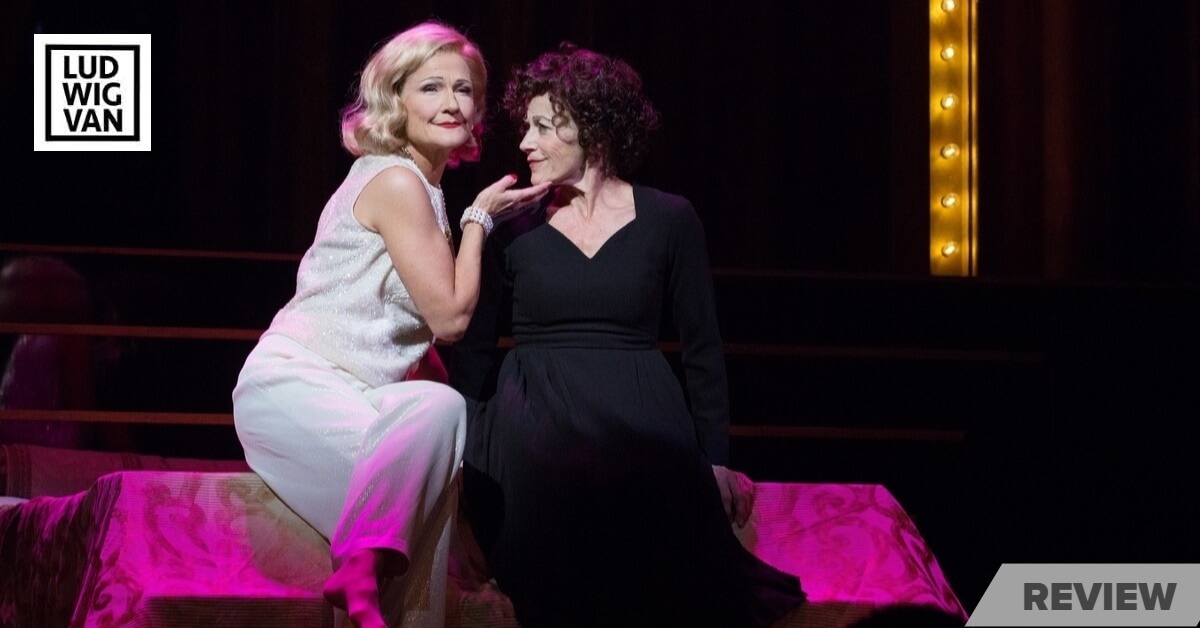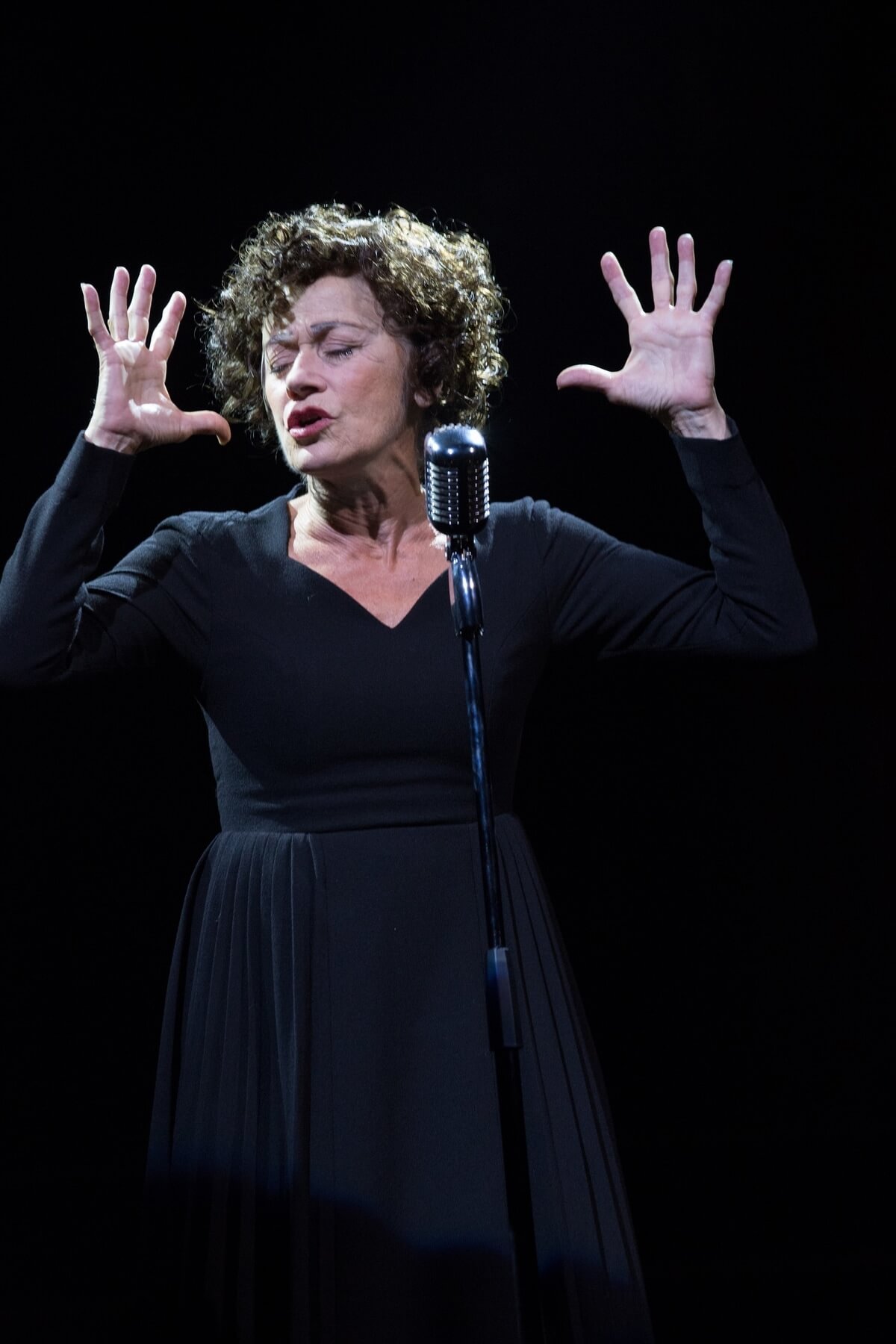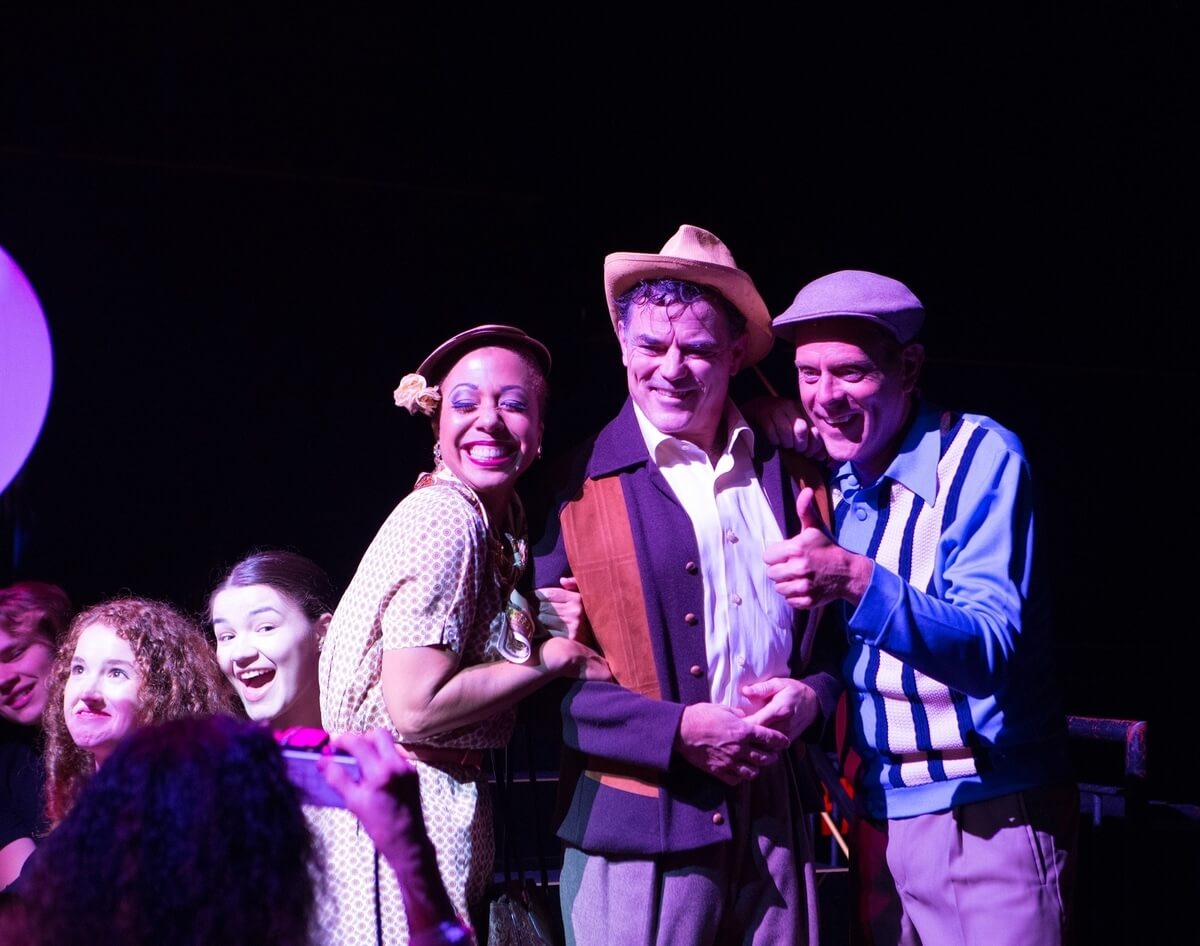Louise Pitre and Jayne Lewis embody the iconic characters, their magic, and their complicated relationship in the Mirvish production of ‘Piaf/Dietrich — A Legendary Affair’.

David Mirvish/Piaf/Dietrich — A Legendary Affair by Daniel Grobe Boymann and Thomas Kahry, adapted by Erin Shields from the translation by Sam Madwar, directed by Gordon Greenberg, CAA Theatre, Sept. 17 to Dec. 22. Tickets available at mirvish.com.
Okay, I admit it. I had tears in my eyes at the end of Piaf/Dietrich as Louise Pitre and Jayne Lewis sang “La Vie en rose”. After riding a two-hour emotional roller coaster with these legendary divas, I finally had to surrender to the overwhelming power of their music and the sadness of their lives. Piaf/Dietrich is based on the tempestuous friendship between these famous polar opposites, one passionate, one repressed, and it makes for compelling theatre.
Edith Piaf (Pitre) was born in Belleville, a suburb of Paris. The daughter of a street singer and a circus acrobat, she grew up in her paternal grandmother’s brothel. Piaf scratched out a living as a street singer until she was discovered by cabaret owner Louis Laplée who gave Piaf her first professional job. The Little Sparrow (la môme Piaf), as she was called, became France’s most famous chanteuse and an international superstar, known for pouring out her heart in her songs. One of Piaf’s most endearing qualities is that she never lost the sensibility of the hardscrabble Paris streets. The singer died in 1963 from cancer, complicated by the ravages of alcohol and drugs. She was just forty-seven.
Born in Berlin, Marlene Dietrich (Lewis) grew up in the upper crust Prussian military milieu of her stepfather, a cavalry officer. After attending boarding school, she studied acting, and it was her starring role in director Josef von Sternberg’s The Blue Angel (1930) that brought her to Hollywood. After a successful movie career, (singing at least one song per film in her throaty distinctive style), the glamorous, alluring Dietrich, the epitome of cool control, became a much-lauded international concert artist. At the end of her life, she was a virtual recluse in her Paris apartment, dying in 1992 at the age of 90.
Piaf/Dietrich has undergone an interesting journey from idea to stage. Judging from their bios, creators Daniel Grobe Boymann and Thomas Kahry would seem to be musical theatre heavyweights in Vienna, as in Austria. They first put together an evening of readings about Piaf and Dietrich and their friendship, interpolated by their iconic songs. It was then that friend David Winterberg suggested that they develop the material into a full-blown play. Under its original title, Spatz und Engel (Sparrow and Angel), the show opened in 2013 at Vienna’s prestigious Burgtheater and became a giant hit, spawning productions all over German-speaking Europe.
Thinking that their show might have a shelf life in English, the men commissioned a translation from another friend, Sam Madwar. Yet again a third friend, Canadian music director Jonathan Monro, took the now titled The Angel and the Sparrow to Montreal’s Segal Centre, who brought in Governor-General Award winning playwright Erin Shields and American stage director Gordon Greenberg, to adapt the material to North American tastes, which I take to mean sharpening the story line.
The Angel and the Sparrow was performed at the Segal Centre in April/May 2018. David Mirvish has now brought the play to Toronto under the title Piaf/Dietrich — A Legendary Affair, which, when you think about it, certainly pinpoints the subject matter. In the German runs, there seems to have been only piano and accordion, but Monro leads an ensemble that also includes bass, violin and drums. As music director, he certainly understands the period nature of the songs, and the orchestrations, with additional input from Mark Camilleri, seem absolutely authentic.
Piaf/Dietrich is much, much more than just a slender script upon which to hang famous songs. The creators have genuinely tried to portray these two legendary twentieth century chanteuses as complex women who shared a complicated friendship. Piaf/Dietrich begins with a calamitous Piaf concert in 1960 when the drug-ridden singer collapsed on stage. We then flashback to 1948, and the powder room of a New York nightclub where the women first meet. Piaf is performing in the United States for the first time, and has bombed badly. Dietrich, who was at the concert, thinks that Piaf is the greatest singer in the world, and takes her under her wing, using her influence to jump start Piaf’s career in America.

What begins as a romantic liaison, (Dietrich was notoriously bisexual), morphs into a lifelong friendship that deteriorates when Piaf slides into destructive behaviour, which is an anathema to the martinet Dietrich. The show ends with Piaf’s death. En route, the writers touch on the highs and lows of both their careers and friendship, with a lot of name-dropping of lovers. Louise Camilleri, Réjean Cournoyer and W. Joseph Matheson perform support roles as needed.
There has been every attempt to generate the songs from the storyline. For example, at her Las Vegas show, Dietrich introduces her music director Bert Bacharach, and then sings his arrangement of the Pete Seeger/Max Colpet song, “Where Have All the Flowers Gone?” By necessity, the dizzying number of scene changes come frequently and often, and Shields has provided a minimum of dialogue that is sharply to the point in order to set up the next song. Her judicious writing is a perfect example of bare necessity and less is more.
Pitre has apparently played Piaf five different times on stage, not to mention recording albums of her songs. She said in an interview that she took the role only because it was something different. As Piaf, Pitre is perfection. The Little Sparrow lives and breathes. Pitre superbly captures the passion that drives Piaf’s lust for life, overlaid by the singer’s waif-like, almost girlish demeanour and naïve idealism. She gives a heartrending performance as the troubled soul beneath the fame, always in search of perfect love.
The ardour behind Pitre’s rendition of Piaf’s iconic songs brings down the house. In the show, the character of Piaf wins in the music department by the sheer expressive force of her singing. Dietrich’s “Lili Marlene” and “Falling in Love Again” can’t possibly reach the fervour of “Non, je ne regrette rein” and “Padam, padam”, but Dietrich the character scores her points through words, and Shields has given her some choice ones.
Lewis nails the cool, confident and controlled Dietrich with her bitchy sarcastic barbs, and almost pompous self-righteousness. For example, when Dietrich finds out that room service breakfast is no longer available, she snaps at the manager that she can always call the Waldorf, and that hotel can bring her breakfast to the Plaza. At one point, Piaf complains that Dietrich is suffocating her, and because Lewis is truly the epitome of this take-charge personality, we can sympathize. We also absolutely believe that Dietrich has had a never-ending parade of lovers. The creators try to rattle Dietrich’s control cage by having Piaf accuse of her of not letting her feelings show, and having an estranged relationship with her daughter Maria, but Dietrich refuses to bite. It is a mark of Lewis’ performance that we sense Dietrich’s inner turmoil.

Michael Gianfrancesco has created a rather bizarre set. It is supposed to represent a stage with a gold-leaf proscenium arch and ornate footlights surrounded by café tables where some members of the audience sit. The actual playing area is squashed between two towering staircases, and includes a lower level and a smaller upper level, separated by steep steps. Pitre and Lewis have to be mountain goats to go up and down, not the mention those audience members sitting on the upper tiers. As a result, the set pieces, like Piaf’s kitchen, look like they belong in a doll’s house.
Nonetheless, designer Michael Walton has had fun, particularly with placing various spotlights on the two divas. Louise Bourret’s costumes, some of them taken from actual designs made famous in photographs, particularly for the ultra-chic Dietrich, are certainly eye-catching, not to mention Piaf’s ubiquitous black dress. Director Gordon Greenberg must have had some job placing his actors up, down and all around the various levels of the set, as well as incorporating lightning fast costume changes. He certainly worked on characterization, which is very strong. By going for a restrained Dietrich, he could unleash an impassioned Piaf. We come away knowing that both women did it their way.
I’m old enough to remember Piaf’s first electrifying appearance on the Ed Sullivan Television Show. I was also lucky to be taken by a visiting cousin to Dietrich’s concert at the then O’Keefe Centre. These iconic artists have remained very much a part of my life. I sincerely hope that the Piaf/Dietrich production will introduce these legends to a whole new audience because their artistry deserves it.
Piaf/Dietrich — A Legendary Affair started to get to me when the first act ended with a duet version of the emotionally-charged “Hymne à l’amour”. “La Vie en rose” did me in.
#LUDWIGVAN
Want more updates on classical music and opera news and reviews? Follow us on Facebook, Instagram or Twitter for all the latest.



